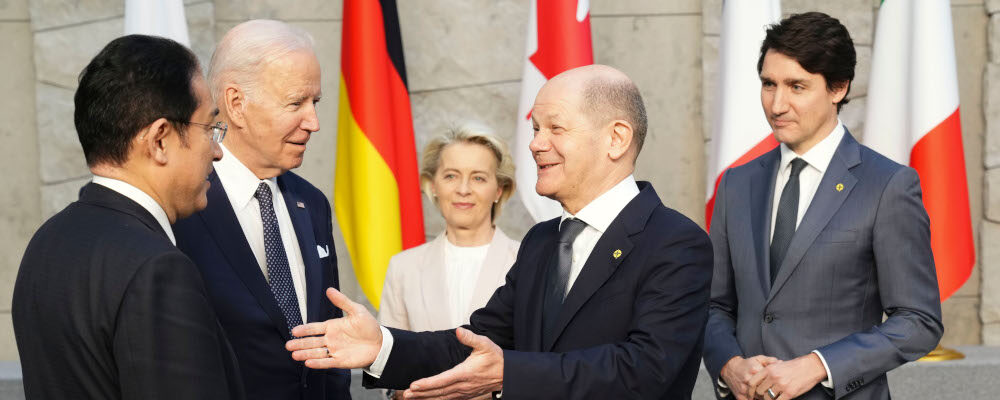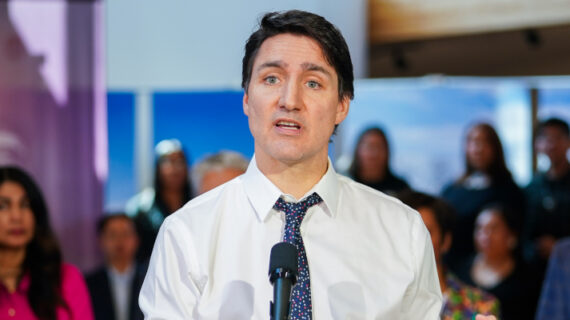The saintly editors here at The Hub have agreed to my request to produce one of my two monthly articles for the site as a monthly transatlantic diary. For those readers not familiar with the format, which is more common in British journalism, the diary is a grab bag of short items, sometimes on a common theme, but often not. In my case, what they have in common is that they are either too inconsequential to merit a full article or I can’t be bothered to come up with more than a knee-jerk reaction or a flip comment. This is July.
Nothing flutters Canadian hearts like foreign praise, and nothing flusters Canadian minds like foreign criticism. There isn’t a ranking of “best places to live” too tendentious that Canadian media won’t breathlessly report it and Canadians won’t shamelessly retweet it. But the flip side is that we have crepe-paper-thin skin when it comes to criticism, especially from our neighbours to the south. This national sensitivity was triggered this month when the Wall Street Journal had the temerity to repeat what Canadian commentators have been saying for more than a decade: we are global free riders on national defence.
Reacting on behalf of a bruised national ego, our infamously thin-skinned United Nations Ambassador Bob Rae tweeted:
Canada is not a free rider in Latvia, Ukraine, the Middle East, Haiti, NORAD, NATO, the Asia Pacific, or anywhere. From Korea to Afghanistan we have been there. And we pay our dues to the UN, on time, including peacekeeping and the International Criminal Court. Like everyone else, we need to do more, and we are doing just that.
For those keeping score at home:
- we have 800 CAF personnel in Latvia (a tiny fraction of the troops we had stationed in Europe during the Cold War);
- we’ve given less to Ukraine than Japan and only a little more than the Netherlands;
- we have almost no presence or relevance in the Middle East;
- we (wisely) declined a larger role in Haiti when the United States asked us to step up;
- we are very much second-fiddle in NORAD;
- we don’t come close to meeting NATO’s 2 percent spending commitment; and
- we have been left out of our allies’ two major Asia-Pacific initiatives.
We did pull our weight and more in Afghanistan, but that ended a few years ago, and Korea ended 70 years ago. We were passed over for a UN Security Council seat in favour of Ireland and Norway the last time we applied, and we haven’t been a real peacekeeping nation in more than a generation. Rae might as well have appealed to the CAF’s gallantry at Passchendaele and Cambrai or the Boer War. It is hard to explain to Canadians who don’t spend a lot of time abroad how irrelevant we are internationally these days, but Rae did a good job making the Wall Street Journal’s point at least as effectively as the original article.
* * *
Still, I’m glad to be back in Canada, although judging from the crowds at the airport departure gates when I landed, I am going against the flow of seasonal migration. Post-Covid wanderlust and TikTok travel influencers are luring Canadians to Europe in record numbers this summer, and as far as I’m concerned, they are welcome to it. I’ve never understood why anyone would leave Canada during the most beautiful months of the year here to visit Europe at its worst. Unless you make the extra effort to seek out places as yet undiscovered by Instagram or have friends with cool retreats in the hard-to-reach countryside, you couldn’t pay me to venture onto the continent after April. Expect heatwaves, crowds, and queues—all at twice the price of the regular months.
European cities in the summer are basically Disneyland without air-conditioning or crowd control. Contrast that with September to March, when you can get a decent reservation without booking two months out and actually breathe in the galleries and museums. I once spent 25 minutes alone in the Sistine Chapel early on a January morning, just me, a dozing guard, and my guide from the Patrons of the Vatican Museums, who graciously stepped out so I could enjoy the silence and solitude. I am very glad not to be heading back until well after the crowds have left to enjoy the slow serenity of autumn.
* * *
Anyway, it has been good to be back in Western Canada, starting with the Calgary Stampede. It’s easy to mock the faux-Western pretensions of the Stampede, but it’s a genuine tradition and it provides more of a sense of regional identity than anything else you’ll find west of Quebec. And at the heart of the Stampede is a real rodeo, one of the best in North America. If you skip the corporate and political events and build your time around the afternoon rodeo—bareback, saddle bronc, bull riding, roping, barrel racing, and steer wrestling—and the evening chuckwagons and Indian Relay races, it’s impossible not to have a great time.
Stampede has always been a strongly integrative experience. For more than a century it has brought Calgarians together, wherever they’ve come from, and local First Nations have been at the core of the vent from the beginning. The first saddle bronc champion was Tom Three Persons, from the Kainai (Blood) Nation, a local cowboy and eventually a successful rancher. There was a Chinese-Canadian Stampede Queen, Jenny Chow back in 1958 (candidates were put forward by local civil society organisations, and Miss Chow was sponsored by the Calgary Fire Department), and four years before that, there was, Evelyn Eagle Speaker, an Indigenous Stampede Queen (the first and still only—there is a separate First Nations Princess who acts as-co Stampede royalty).
Now that Canada, having given up without even trying on boosting our birth rate, plans to grow rapidly and almost exclusively through immigration, events like Stampede are more important than ever. During Stampede, most businesses, neighbourhoods, as well as religious and ethnic communities, host pancake breakfasts, and you can see families who just arrived in Canada wearing the same Western outfits as enthusiastically and unconvincingly as any native-born Calgarian. I often wonder what a newcomer to Southern Ontario does to signal that they want to be an active part of their new community—call into The Fan to complain about the Leafs’ management, I assume. Canada has too few truly communal festivals—events that bring us together as part of a shared culture in a place with a proud history and a distinct identity—to afford to be cynical about Stampede.

* * *
From Calgary to Victoria, where I grew up and my parents still live. Most of the city, including my old neighbourhood, is still as idyllic as ever and at least superficially unchanged, but the downtown has visibly degenerated in the last decade so that several downtown blocks resemble the grittier parts of Vancouver. At the same time, developers have busted through the city’s old notional height restrictions to erect shiny new condo towers with harbour views. Give it another decade and the skyline will be a miniature copy of Vancouver or Toronto, my metwands for banal urbanity.
Toronto’s physical unloveliness is now internationally proverbial. At recent a architecture lecture I attended in Oxford, a speaker damned London’s current development—an invading army of skyscrapers in the internationalist style—by comparing it to Dubai…and Toronto. Vancouver’s ugliness is less commonly noted, but that’s because the repetitive glass towers are overshadowed by such an extraordinary natural setting. When people say Vancouver is a beautiful city, what they mean is it’s a city in a beautiful place. The built city, at least the parts built after 1970, ranges from dull to dire. I love Vancouver, but there aren’t six buildings you would be excited to show off to a visitor. And with wealthy residents isolated in mirrored boxes high above the squalid alleys and spreading encampments, it is increasingly grotesque, aesthetically and morally.
Still, as I said, it is good to be back in the West, where Canada still feels vital and confident, even if the wider country is sliding into irrelevance.




